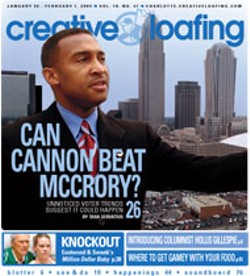Can Cannon beat McCrory?
Unnoticed voter trends suggest it could happen
Page 2 of 4
Brian Francis, campaign manager for former County Commissioner Ruth Samuelson, a popular white Republican whose political career was derailed by high black turnout this fall, also sees the writing on the wall.
"If the Democrats can replicate that in off-year elections as well as presidential elections, Republicans have a huge problem," said Francis. "There's no other way around it. The numbers just don't work."
But replicating the November 2004 level of African-American and Democratic turnout in November 2005's citywide election would be a real feat for the local Democratic Party, which at the moment is struggling to find the money to keep its headquarters open.
That's a far cry from where the party was in November, when over 200 volunteers, working 40 to 60 hours a week, making phone calls and knocking on doors, produced the greatest Democratic turnout in the county's history. Of course, that huge turnout was also funded by what was probably the largest chunk of change ever dropped on Mecklenburg County in an election. Though no official figure exists, the unofficial consensus from Democratic strategists who would know is that various tax-exempt organizations and the campaigns of Erskine Bowles, Mike Easley and John Kerry pumped about $1.4 million into Mecklenburg County over several months in an effort to get themselves elected.
This fall, with no national or statewide races on the ballot, the local Democratic Party will be largely on its own financially, as it usually is in City Council and mayoral elections, which fall in odd-numbered years.
At first glance, it would seem that Republicans should never be able to win races in Charlotte. Some 47 percent of registered voters are Democrats, 31 percent are Republicans and 21 percent are unaffiliated. But in those off-year city elections, Republicans usually turn out in large numbers. Year after year, about 46 percent of those who actually vote in city elections are Democrats, 40 percent are Republicans and 14 percent are unaffiliated. Republicans are able to win because half the unaffiliateds vote Republican, as do some Democrats.
And while a third of the city's registered voters are black, African-American turnout typically runs at 25 percent or less, while white turnout hovers around 74 percent in city elections. That's why, in city election after city election over the last decade, McCrory has been able to keep the mayoralty and two Democrats and two Republicans have won in at-large races.
It's also why party strategists took minimal notice of the growing increase in black voter registration.
"Their propensity to register is greater than their propensity to turn out," says UNCC political science professor Ted Arrington of African-American voters. "I think that what happened last year is that they were so pissed off at George Bush that they did in fact turn out. Whether they will turn out in November — and maybe for Cannon they will — nobody knows. If they don't, there's no way he can win."
Even Cannon admits that the Democratic victory in Mecklenburg last fall might not be easily duplicated.
"I don't think one can weigh what happened in the presidential election too much as you talk about elections that are off-year, where you don't have the number of people that are coming out," said Cannon.
So how did Harvey Gantt, Charlotte's first black mayor, manage to win two terms between 1983 and 1987, then?
Those were different times, says Arrington, and Gantt had the full support of the business community, something Cannon, or most other Democratic challengers for mayor, likely wouldn't get today. Historically, Arrington explained, "The business community saw that integrating the schools and busing and having a black mayor were steps they could take that could keep Charlotte as the city that works." With national racial tensions down, he says, that trend has ceased.
Where's the money?
For Cannon, raising money to fund the large turnout he would need in a mayoral race might be harder than it's been in the past, because Charlotte's business culture has changed as well over the last decade, says Arrington. Democrats, however, would be excited about having a genuine shot at the office and could make up the difference.
"A few years ago, you had the chairman of Bank of America contributing to Democratic causes and now you have got the chairman of Wachovia and Bank of America giving tens of millions of dollars for the (presidential inauguration) in Washington," said Arrington. "People who used to be at least bipartisan in the business community, they're just not there anymore. The business community has become much more hard Republican than it used to be."
Latest in Cover
Calendar
-

NEW WINDOW GALLERY-Pat Rhea-ACRYLIC PAINTINGS-April 05-30 2024 VALDESE, NC 28690 @ New Window Gallery/Play It Again Records
- Through April 30, 12 p.m.
-

TheDiscountCodes
-

"Blood Residue Analysis of Paleoamerican Stone Tools in the Carolinas" @ Native American Studies Center
- Fri., April 26, 12-1 p.m.
-

Brightfire Music and Arts Festival @ GreenLife Family Farms
-

ARTS RENAISSANCE, a GALA supporting the ARTS in South Carolina @ the Columbia Museum of ART
-
5 Online Player Communities to Join in Michigan
-
A beginners guide to online sports betting in the US
-
I Changed my Sex. Now What?
Scott Turner Schofield's rapid transit to a new identity










